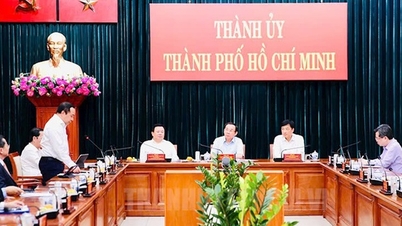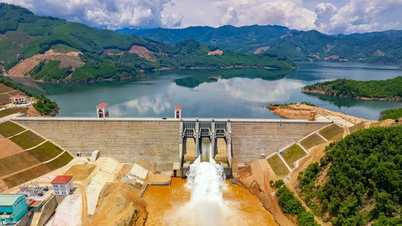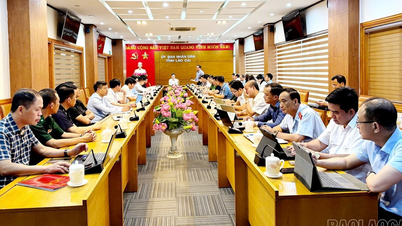
On the morning of November 24, with 468/472 delegates in favor, the National Assembly officially passed the Law on Telecommunications (amended). The law consists of 10 chapters and 73 articles.
Responding to VietNamNet , a representative of the Telecommunications Department said that the Telecommunications Law was researched and revised based on international experience and practices as well as trends in Vietnam.
Specifically, the Law on Telecommunications (amended) has studied and learned from the experiences of advanced countries that have recently amended and adjusted the legal framework on telecommunications, such as European countries, the United States, Korea, Japan, China and ASEAN countries such as Malaysia, Singapore, etc. to promptly supplement management regulations for data center services, cloud computing services, basic telecommunications services on the Internet, in line with the development trend of the telecommunications sector, the convergence trend between telecommunications and information technology.
A representative of the Department of Telecommunications said that the Fourth Industrial Revolution, digital technology, and digital transformation have taken place strongly at an unprecedented speed over the past 10 years, having a great impact on the telecommunications sector.
Telecommunication infrastructure, which was originally traditional communication infrastructure, has become a new type of infrastructure, digital infrastructure - the infrastructure of the digital economy.
Digital infrastructure includes broadband and universal telecommunications infrastructure, IoT infrastructure, data center and cloud computing infrastructure, digital technology infrastructure such as services and digital platforms of infrastructure nature.
Digital infrastructure is much more important than telecommunications infrastructure, ensuring broadband and ultra-broadband, universality, sustainability, greenness, intelligence and security. Developing digital infrastructure will become increasingly costly and will need to be integrated and shared with other infrastructures.
In the trend of digital transformation, data becomes the most important resource of the digital economy, the new input of production, so many countries attach great importance to data center infrastructure, cloud computing and issue policies and regulations for management.
Data centers and cloud computing will become the most important components of digital infrastructure, requiring appropriate policies to ensure sustainable development.
The representative of the Telecommunications Department said that the convergence of telecommunications, information technology and recently the convergence with digital technology. This convergence blurs the boundary between telecommunications and information technology, posing new requirements for building and perfecting institutions.
“In the past, providing telecommunications services required telecommunications network infrastructure. Managing network infrastructure businesses also meant managing telecommunications services. But today, on the Internet, telecommunications services (including basic telecommunications services on the Internet) and cross-border telecommunications services can be provided. This raises the issue of managing telecommunications services on the Internet, managing cross-border telecommunications services to ensure the principle of equal management between telecommunications services and safety and security issues,” said a representative of the Department of Telecommunications.
Continuing to share about the reality in Vietnam, the Department of Telecommunications said that since 2010, Vietnam has participated in many free trade agreements, especially new generation free trade agreements such as the Comprehensive and Progressive Agreement for Trans-Pacific Partnership, the Vietnam-EU Free Trade Agreement... with new and higher commitments than Vietnam's commitments when joining the World Trade Organization.
The general legal environment has also changed a lot. Since 2010, Vietnam has continued to improve its institutions, such as: Enterprise Law, Investment Law, Competition Law, Planning Law, Law on Management and Use of Public Assets, Property Auction Law, Price Law... which have been newly issued, amended, and supplemented with contents related to the telecommunications sector.
Therefore, the Telecommunications Law needs to be reviewed and adjusted to ensure consistency and uniformity of the legal system, avoiding conflicts with other existing or amended laws.
The revised Telecommunications Law has been researched and developed based on international experience, development trends and practical requirements of the Vietnamese telecommunications industry, overcoming institutional problems and shortcomings in the provisions of the 2009 Telecommunications Law and related legal provisions that limit the development process.
In addition, the revised Law on Telecommunications will be consistent with the legal system, in line with international commitments of which Vietnam is a member; contribute to simplifying administrative procedures, orienting the development of universal broadband telecommunications infrastructure, data centers, and cloud computing in a sustainable and modern direction; forming digital infrastructure to meet the requirements of digital economic and digital social development, contributing to ensuring national defense, security and improving the quality of life of the people.
The representative of the Telecommunications Department also emphasized that the revised Telecommunications Law will create an important premise to realize the telecommunications development goals in the Party's resolutions and improve Vietnam's ranking in the world telecommunications development index.
Source






![[Photo] Close-up of An Phu underpass, which will open to traffic in June](https://vphoto.vietnam.vn/thumb/1200x675/vietnam/resource/IMAGE/2025/5/15/5adb08323ea7482fb64fa1bf55fed112)
































































































Comment (0)